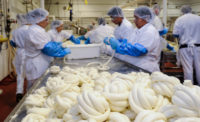Hispanic cuisine makes up a large portion of the food market in the United States, and the demand of Hispanic-style cheeses has been rising over the past two decades.
Even though Queso Fresco is the most widespread Hispanic-style cheese in the United States, there are many others manufactured across the country including melting cheeses, such as Oaxaca and Adobera, and mildly aged chesses, such as Chihuahua and Cotija.
In general, Hispanic-style cheeses have high moisture and a short shelf life, but most such cheeses also provide favorable conditions for the growth of many microorganisms. In particular the pathogenic bacterium Listeria monocytogenes is of considerable health concern for pregnant women (due to causing miscarriages) and the elderly, despite the overall rarity of infection.
Outbreaks caused by L. monocytogenes have been often linked with consumption of Hispanic-style cheeses. It can be estimated that about one of every five listeriosis outbreaks in the United States in the last 15 years or so have resulted from consumption of Hispanic-style cheese.
Occurrences of Lm in Hispanic-style cheeses
Surveys have shown that L. monocytogenes can be found in commercial and handcrafted Hispanic-style fresh cheeses, such as queso fresco, panela and adobera. The frequency of detecting L. monocytogenes ranges from 1 out of every 1,000 cheeses to 1 out of every 5 cheeses.
However, only a small number of these surveys have been conducted in the United States, leading to uncertainty about the extent of the risk of L. monocytogenes in Hispanic-style cheeses manufactured in the United States. Studies that were conducted in cheeses processing plants in both Mexico and the United States showed that L. monocytogenes was found on utensils, equipment and floors, highlighting the potential risk of L. monocytogenes contamination in the cheese plant even if the milk for cheese making is properly pasteurized.
Since there are no additional barriers to combat L. monocytogenes in Hispanic-style cheeses after the milk is pasteurized, the incorporation of antimicrobials seems to be the most appropriate approach. However, the majority of antimicrobials investigated, including organic acids, bacteriocins, fermentates and lauric arginate, and even physical treatments such as high-pressure processing or the application of antimicrobial packagings, do not completely eliminate L. monocytogenes in the cheese. The surviving bacteria are able to continue multiplying during refrigerated storage in the cheese, posing a health risk for consumers. There is a need to investigate novel antimicrobials capable of inhibiting L. monocytogenes in Hispanic-style cheeses.
The potential of endolysins
Endolysins, enzymes found in bacteriophages and able to cut specific linkages in the cell wall of Listeria causing its death, have shown promising results for their potential antilisterial applications in Hispanic-style cheeses. PlyP100, an endolysin derived from the GRAS bacteriophage P100, has been shown to lyse each of the L. monocytogenes strains tested independent of their origin, while targeting few other gram positive organisms.
PlyP100 has been tested under three of the most important of environmental conditions for an antimicrobial: pH, salt concentration and temperature. PlyP100 reaches its optimal activity at approximately pH 7 which indicates that it is a suitable antimicrobial for Hispanic-style cheeses. PlyP100 maintained a relatively high percentage of its activity between 1 - 2 % NaCl. Full activity of PlyP100 is maintained between 37 C and 50 C; however partial activity is still present at refrigeration temperatures. These results suggest that PlyP100 works in the range of salt concentrations typical to fresh cheeses and that it should not lose activity throughout the temperatures associated with cheese manufacturing and storage.
PlyP100 was added to the drained curd of a miniaturized laboratory-scale queso fresco in order to investigate its effectiveness against a set of cheese-relevant Listeria strains during storage at 4 C. Not surprisingly, L. monocytogenes grew well in the untreated queso fresco. The cheeses treated with PlyP100 showed a strong listeriastatic effect by maintaining similar listeria cell counts after 28 days of storage compared to the initial inoculum.
This is, to our knowledge, the first use of an endolysin for the preservation of a dairy product over the course of its shelf life. PlyP100 is promising antimicrobial for dairy products due to its environmental tolerance and microbial specificity. It seems unlikely to negatively affect the desirable bacteria native to most dairy fermentations.
PlyP100 is effective at inhibiting the growth of Listeria in laboratory fresh cheeses and warrants follow up within further dairy manufacturing applications.
Resources for food safety
Alchemy Systems, Austin, Texas, has a new online training course library that meets the specific needs of dairy processing facilities, including those addressing the requirements of the Food Safety Modernization Act. Topics include: Introduction to Pasteurization, Milk Receiving Processes, Bacteria Basics, Controlling Salmonella, Dairy Handwashing Techniques, Personal Hygiene for Fluid Products, Promoting Dairy Hygiene, Preventive Controls for Dairy, Preventing Dairy Contamination, and Understanding Listeria in Dairy.
Visit www.alchemysystems.com/dairy-solutions.
The continuing and professional education division of University of California-Davis offers basic and advanced courses in the Hazard Analysis and Critical Control Point (HACCP) system. The Basic HACCP: A Food Safety System will be held Oct. 16 to 18. The Advanced HACCP: Verification, Implementation and Other Challenges workshop is scheduled for Oct. 19 to 20. For more information or to enroll, call 800-752-0881 or visit the website www.extension.ucdavis.edu.



